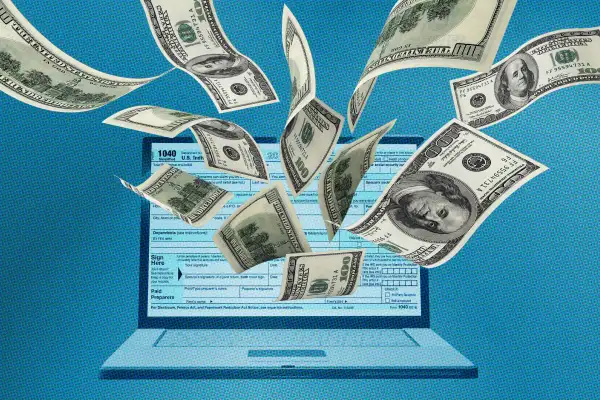A Quarter of Americans Expect Smaller Tax Refunds This Year

Americans are heading into tax filing season with some financial anxiety, with many expecting a lower refund than last year.
A December survey of 2,500 adults by tax prep software company TaxAct found that a quarter of taxpayers said they think they’ll get a smaller refund in 2024 (for their 2023 tax return) than they did in 2023 (for their 2022 tax return). More than a third anticipate that their tax refund will be about the same amount.
With COVID-era programs that bolstered refunds in recent years officially in the rearview, these expectations could become reality for many taxpayers this year.
Tax season 2024 expectations
A quarter of respondents to the the TaxAct survey said they anticipate receiving a lower refund this year, while about the same share said they think they’ll get a higher one — meaning they'll receive more money back from the IRS as a reimbursement for overpaying taxes. About 35% predicted they'll get the same amount, and 16% said they weren’t sure.
Overall, taxpayers appear to be feeling uncertain ahead of tax season, with 35% saying they’re worried about filing incorrectly. About 37% said they’re having trouble understanding what deductions to take, and 29% said they’re concerned about being audited.
Why tax refunds have fluctuated in recent years
Last year, the average tax refund for the week ending Dec. 29 was $3,167, according to IRS filing season statistics — about 2.6% lower than it was the previous year.
Refunds were higher in 2022 thanks to pandemic policies (notably, stimulus checks and the expanded child tax credit) that helped support Americans through the financial impact of COVID-19. Taxpayers who qualified for stimulus-check or expanded-child-tax-credit funds but didn't receive advance payments were able to claim them on their tax return and get the money in their refund.
In fact, the expanded child tax credit is the subject of an ongoing discussion. When lawmakers increased the child tax credit to a max of $3,600 per child in 2021, they also raised the age limit and made the credit fully refundable. But the government let this policy expire, and Democrats have been pushing ever since to expand the child tax credit again. There's been recent movement on that front: A proposal to expand the child tax credit in time for the 2024 tax season, albeit to a lesser extent, passed a House committee last week.
Is getting a big tax refund good?
All said, because special programs and credits increased refunds in 2022, taxpayers saw smaller refunds last tax season. This year, the same thing could happen again, or they could see refund amounts similar to last year’s.
But that’s not necessarily a bad thing: While it may seem like bigger is better when it comes to tax refunds, it could actually mean you’re paying too much in taxes during the year. Essentially, that means you've been providing an interest-free loan to the government when you could have received that money in your paycheck.
The IRS will start processing tax returns on Monday, and Tax Day in most states is on April 15. If you’re owed a refund, you can generally get it faster by filing earlier. (One notable exception is for taxpayers who claim the earned income tax credit or additional child tax credit — they won't receive their refunds until mid-February at the earliest.)
Taxpayers in certain states may be able to file taxes for free directly to the IRS using its new Direct File pilot, which will enter beta testing this tax season. The agency also expanded its Free File program to anyone who had an AGI of $79,000 or less in 2023.
Find out more about key dates and what to look out for this tax season in this Money story.
More from Money.com
When Are Taxes Due in 2024? Here Are the Deadlines You Need to Know
Don't Wait 'Til April: Knock Out These 5 Tax Tasks Now
2024 Tax Brackets: IRS Increases Income Thresholds, Standard Deduction Due to Inflation

